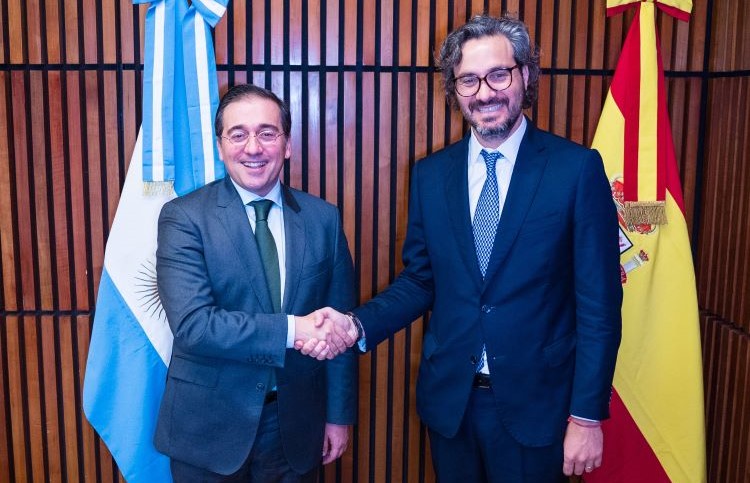The Diplomat
The Minister of Foreign Affairs, José Manuel Albares, was received yesterday in Buenos Aires by his Argentine counterpart, Santiago Cafiero, with whom he discussed, among other issues, the possibility of Argentina “being a sustainable energy supplier for the EU” through “Spanish ports”.
The meeting took place on the eve of the III Ministerial Meeting between the European Union (EU) and the Community of Latin American and Caribbean States (CELAC). Argentina, which holds the pro tempore presidency of CELAC, is hosting this joint meeting of the foreign ministers of both international blocs, in which, under the slogan Renewing the bi-regional partnership to strengthen peace and sustainable development, issues such as economic recovery after the pandemic, innovation, the fight against climate change, disaster risk management, the digital agenda and multilateralism, among others, will be addressed.
During the meeting, as reported by the foreign ministries of both countries, the two ministers approved a Joint Declaration in which they expressed their confidence that the EU-CELAC meeting in Buenos Aires “will raise the profile of the strategic relationship between Europe and Latin America and the Caribbean”, and advocated, in this regard, “to boost the relationship to its full potential, both in the field of investment and connectivity as well as in trade”, and stressed “the importance of the Association Agreement between the EU and Mercosur, as well as the cooperation mechanisms that can bring the societies of both blocs of countries closer together”.
Likewise, Albares and Cafiero reviewed the existing perspectives within the framework of the Plan for the Internationalization of the Spanish economy, highlighted “the growing presence of Argentine investment companies in Spain”, which is “the second foreign investor in Argentina”, and analyzed “the perspectives of maintaining and increasing the investment flow in both directions, consolidating the conditions that make it possible”. Besides, both Ministers addressed “in detail” the status of compliance with the bilateral Strategic Action Plan for the 2021-2023 biennium, and expressed their satisfaction for the achievements obtained in its execution. In this sense, the Argentine Ministry of Foreign Affairs highlighted, in a press release, that “the existing harmony between Argentina and Spain is the basis of the strategic partnership on which both governments are actively working, and which has been boosted in recent high-level meetings”, such as the visit of the President of Argentina, Alberto Fernández, to Madrid in May 2022 and that of the President of the Spanish Government, Pedro Sánchez, to Buenos Aires in June 2021.
Energy supply
The two ministers also addressed the current world energy crisis and “the possibilities for Argentina to be a sustainable energy supplier for the EU, as well as the possibilities that may arise for its entry through Spanish ports,” the Joint Declaration continues. Last May, during the official visit of President Alberto Fernandez to Madrid, the Government of Argentina offered itself to the European Union as a “stable and secure” supplier of energy and food, coinciding with the European attempts to find alternatives to Russian gas after the invasion of Ukraine by the President of Russia, Vladimir Putin.
Around the same time, Moncloa stressed that the two governments are willing to “increase cooperation in the digital and energy fields, especially in the gas and lithium sectors”, and Cafiero himself declared in Madrid that the latest large-scale infrastructure works in the Néstor Kirchner gas pipeline in Vaca Muerta “will allow Argentina to be self-sufficient in energy and the possibility of being a natural exporter of liquefied natural gas” and that, for that reason, Fernández himself had “emphasized that Vaca Muerta can be a supplier of natural gas for Spain and the region”. The Chancellor also recalled that Spain has 30 percent of the regasification plants in Europe, which could facilitate a bilateral agreement with a view to supplying gas to the whole continent.
Other issues
Likewise, Albares and Cafiero pointed out yesterday “the importance of reviewing the functioning of the international financial institutions so that they promote a model of sustainable and inclusive development” and, in this sense, Argentina thanked Spain for its support in the negotiations with the IMF. In addition, they ratified their support for “a rules-based multilateral trading system”, highlighted the mutual cooperation between Spain and Argentina in the field of human rights, reviewed bilateral cultural cooperation and committed to achieve full mutual recognition of degrees, diplomas and academic degrees in higher education.
Albares and Cafiero also agreed to further strengthen the bilateral relationship in consular cooperation, based on the Memorandum of Understanding on Consular Cooperation between Spain and Argentina, signed in Madrid on February 23, 2017, and committed to meet before the end of this year to assess the progress and modalities of their consular cooperation and exchange information. Albares’ visit comes almost a week after the entry into force of the new Law of Democratic Memory (popularly known as the “Law of Grandchildren”) that facilitates the granting of Spanish nationality “as a reparatory measure for people who suffered exile.” According to the Argentine press, those in charge of the consular office in Buenos Aires, the largest and most representative of Spain in the world, are expecting around 60,000 applications.
The two ministers also addressed the question of the Malvinas Islands and reiterated, in this regard, the importance that, in application of international law and in compliance with the permanent resolutions of the General Assembly and the provisions and objectives of the United Nations Charter, including the principle of territorial integrity, bilateral negotiations with the United Kingdom be resumed.







